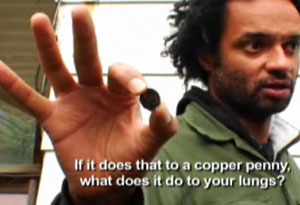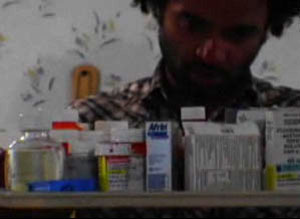


I recently saw a very sad and illuminating video called Toxic West Virginia. Part of it consists of an interview with the father of a family currently living in West Virginia. The family is slowly being poisoned to death by chemical contaminants in the water, which were put there by local coal mining companies.
Apparently, the father (B.I. Sammons) was examined by a doctor in N.Y. who told him:
"I'm not sure how you're even still alive, given the amount of mercury in your brain."
The video goes on to show that the family's well water is black, and visibly erodes copper pennies exposed to said water within 36 hours, changing their color and wearing off the stamped contours on the front and back.
Mr. Sammons believes in God. He mentions this near the end of the video and gives some insight into his beliefs.
I've thought a lot about belief in God and the differences (and similarities) between people who believe in God and those who don't.
I used to have a strong negative view on religions like Christianty, developed mostly by ignoring any positives and focusing only on the negatives. This is a viewpoint I've extensively refined over the years and have arrived at a more balanced conclusion that accounts for both sides.
For example, belief in God has many benefits, among them:
- It can cause people to "think outside of themselves", which hopefully has the effect of lessening selfish behavior.
- It can create communities around shared beliefs (implicit in there is that communities are overall beneficial).
- It can bring comfort concerning very difficult topics like death (even though it's only illusory comfort).
- It's usually accompanied by a set of shared moral values, many of which I agree with (E.g.: I'm a big fan of Thou shalt not kill).
Belief in God has a couple of clear and profound negatives, and these are tricky because in order to consider them specific to belief in God, they need to have no equivalent construct in say, atheism. Said another way: if you're going to point out a negative in someone else's belief system, said negative probably should not exist in your own belief system.
A Parenthetical Aside: Some Examples
Here are two common examples of what I consider to be unfair criticism of people who believe in God:
- Atheists accuse people who believe in God of living in a world of illusion, in essence, of believing in something that doesn't exist. I also believe this is true, but I additionally believe that most atheists also live in a world of illusion, believing in things that don't exist (E.g.: three economic-related illusions are (i) rational markets (ii) the free market (iii) that consumers make rational choices (iv) unlimited growth can be sustained indefinitely, and (v) that if I simply purchase enough material goods, I will be happy).
- Atheists accuse God believers of believing in something that's harmful I also believe this true (though not nearly as much as others), but I think that atheists also believe in (and practice) many things that are harmful (E.g.: i know many atheists who believe substance abuse is not only not harmful, it's enjoyable. Same goes with rampant, disposable consumerism and it's effect on the planet).
- Atheists accuse God believers of being addicted to their religion and/or to their belief. I'm sure this is true in a certain percentage of believers, but the problem being Athiests are addicted to any number of things, including work, power, money, substances, sex, etc.
Given that constraint, the one significant negative (and tangible) artifact of belief in God is that you might not seek to better your life here and now because you believe your fate is "in God's hands".
A common example is a parent, or parents, who eschew medical care for their child because they believe that the child's health rests in God's hands. There are many other examples, but Mr. Sammons provides a clear example towards the end of the documentary.
Near the end of the documentary, we learn that the man's daughter has a cyst of unknown origin on her face and was prescribed an antibiotic as treatment, and that the man's son has been taking a daily course of antibiotics for most of his life. The father himself takes an entire tray of various pills each day ("That's what I need to take on a daily basis to stay alive"), the record of which he keeps in a book, and of which his doctor told him:
"I'm not going to be here long, because you cannot live with that many chemicals in your body. I'm just telling you the truth... I'm telling you what the doctor told me: don't plan on being here for very long taking that kind of medicine".
In the last minute of the video (@5:13), the interviewer asks the father what he plans on doing about the fact that him and his family are slowly being poisoned:
Q: What do you think every night before you go to bed?
A: You pray before you go to bed, and you just ask God to take care of your family... that's all you can do, because man has done the damage to the Earth, and I don't see how man can correct what's been done. God can handle this. He will, when the right time comes, He will do what has to be done.
His answer is incredibly sad on multiple levels. On one level, it's the response of a defeated man who probably lacks the socioeconomic resources to [literally] move his family away from West Virginia or to hire a lawyer and begin the process of litigating the coal companies into safe practices.
The other level is the more provocative one in that it illustrates a significant/massive negative consequence of this man's faith in God: instead of moving his family out of harms way, he leaves their [and his] fate "up to God".
One could argue that his faith in God will cost him, and his children, their lives.
Here's the clip, Part 5 of 5, of the documentary:
The entire series is available here.



 Feed
Feed


